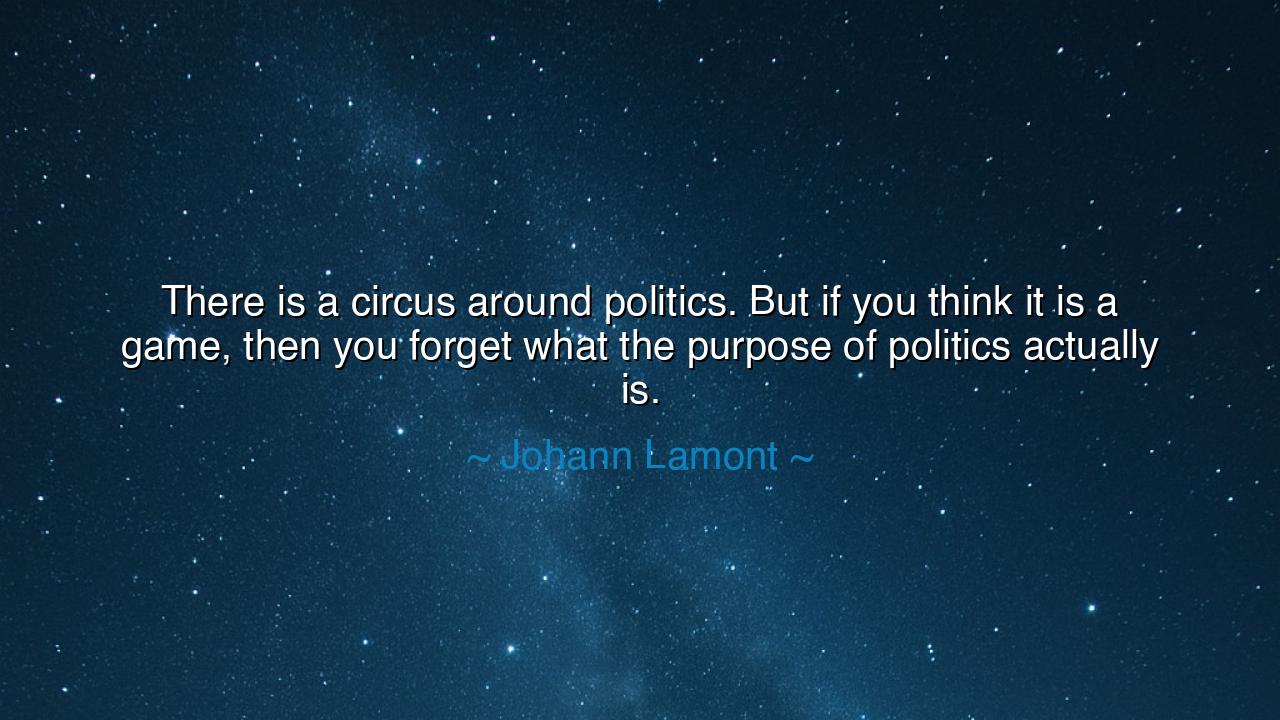
There is a circus around politics. But if you think it is a
There is a circus around politics. But if you think it is a game, then you forget what the purpose of politics actually is.






Hear, O seekers of truth, the sobering words of Johann Lamont: “There is a circus around politics. But if you think it is a game, then you forget what the purpose of politics actually is.” In this utterance, she casts light upon the folly of an age where spectacle and rivalry have often replaced service and duty. She names politics a circus, filled with noise, performance, and distraction. Yet her warning is grave: to treat it only as entertainment is to forget that politics is the sacred work of shaping lives, defending justice, and building the future of nations.
For indeed, the game of politics is enticing. Leaders seek to outwit rivals, score victories in debate, and dazzle the crowds. Parties behave as players, each move calculated for advantage rather than truth. But Lamont reminds us that while the game may amuse, beneath it lie the real lives of people—the hungry, the poor, the sick, the vulnerable—whose fates are bound to the choices made in those chambers. To mistake the struggle for a contest alone is to betray the very soul of governance.
History shows us this danger. In the last days of the Roman Republic, senators treated politics as sport, aligning with factions not for the good of Rome, but for their own ambition. They cheered victories in rhetoric while the Republic itself rotted from neglect. What began as a circus of power ended in the collapse of freedom, replaced by empire. Thus Lamont’s words remind us: when politics becomes game, it ceases to be service, and the people pay the cost.
Yet there are brighter examples. Consider Abraham Lincoln, who in the midst of America’s great division never treated politics as mere spectacle. He bore the weight of war and freedom with solemnity, declaring that government must be “of the people, by the people, for the people.” For him, politics was not a game to win but a mission to preserve the union and bring justice to the enslaved. His life reveals what Lamont means by remembering the purpose of politics—not entertainment, but service to humanity.
Therefore, O children of tomorrow, let this be your wisdom: beware the circus, for though it dazzles the eye, it blinds the heart. Politics is no trivial contest, but the craft of building a just world. Leaders who treat it as a game betray their people; leaders who treat it as duty preserve their nations. Hold fast to Lamont’s warning, and remember always: the purpose of politics is not victory, but service.






NLNhu Le
The notion that politics has become a circus might seem harsh, but there’s truth in the idea that it can often feel more like a performance than a serious pursuit. If we treat it as a game, how does that affect the way policies are made? Are we in danger of losing sight of the true purpose of politics—governing and serving the people? Can we ever reclaim politics as a space for meaningful action?
2N27. Nhiii
Lamont's words emphasize the risk of treating politics as just another entertainment spectacle. But how much of this circus is driven by public demand for drama versus the manipulation of media? Do we, as citizens, play a role in perpetuating the sensationalism surrounding politics? How do we create a more informed electorate that understands politics as a tool for real change rather than a sideshow?
NTNguyen Ngoc Thao
Johann Lamont’s quote makes me reflect on how politics has evolved into a form of entertainment. When did we start treating important decisions as part of a game? Could the obsession with political power struggles distract us from the very real consequences of political actions on people's lives? How do we hold politicians accountable while ensuring that the focus remains on the issues that truly matter?
TLTuong Le
The idea that politics has become a circus makes me wonder: have we reached a point where the entertainment value of political conflict overshadows its practical importance? If we treat politics as a game, are we undermining the impact it has on real lives? Is there a way to reclaim the genuine purpose of politics, or are we too far gone in our obsession with drama and spectacle?
HPLe Huynh Phuc
Lamont's comment highlights how the media and public perceptions often turn politics into a game, where the stakes become clouded by sensationalism. Can we, as a society, shift away from the constant focus on political theatrics? How do we ensure that political discourse centers around solving real issues rather than the performances of political figures? Is it too late to return to more serious, purpose-driven political engagement?